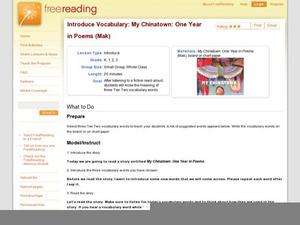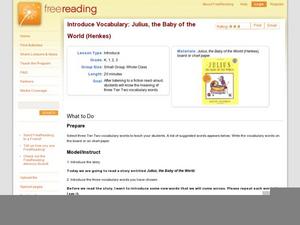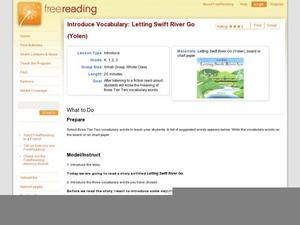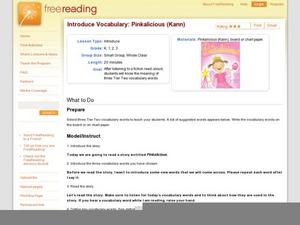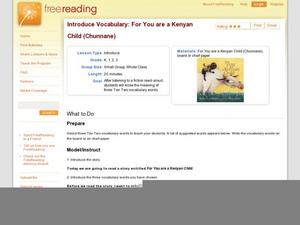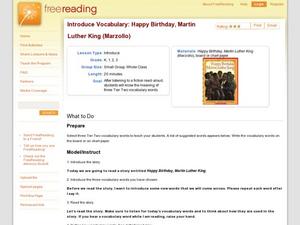Curated OER
Introduce Vocabulary: I Am Planet Earth (Marzollo)
Explore the world's beauty with Jean Marzollo's colorful book I Am Planet Earth, the context of a vocabulary study focused on the following in-text words: globe, jungle, paddy, planet, and valley. Discuss the text briefly and introduce...
Curated OER
Introduce Vocabulary: Over in the Meadow (Keats)
If you're reading the classic story Over in the Meadow, consider this strategy to cover vocabulary in context with budding readers. After a brief introduction, listeners raise a hand when they hear each word (bask, burrowed, and cawed)...
Curated OER
Introduce Vocabulary: Fly Away Home (Bunting)
Approach a difficult subject with budding readers through Eve Bunting's story Fly Away Home, a child's perspective on homelessness. Focus on vocabulary in context, going over the terms learners will hear before reading aloud. There are...
Curated OER
Introduce Vocabulary: My Chinatown: One Year in Poems (Mak)
Beautiful illustrations and tender memories of cultural identity make Kam Mak's story My Chinatown an ideal resource for budding readers learning four vocabulary words in context: fortune, scraps, soar, and victory. Introduce these...
Curated OER
Introduce Vocabulary: Julius, the Baby of the World (Henkes)
Lilly is jealous when her new little brother is born; explore vocabulary in context through Kenvin Kenkes' story Julius the Baby of the World. Suggested words for this text are: constantly, disguise, disgusting, extraordinary, quiver,...
Curated OER
Introduce Vocabulary: Make Way for Ducklings (McCloskey)
Use the Caldecott Award-winning book Make Way for Ducklings by Robert McCloskey (which can be found on YouTube if you don't have it) to guide budding readers through vocabulary in context. Although the instruction here is limited to the...
Curated OER
Introduce Vocabulary: Miss Bindergarten Stays Home (Slate)
What is Miss Bindergarten up to now? Joseph Slate's story Miss Bindergarten Stays Home is an excellent resource for budding readers to practice five vocabulary words in context: advise, lesson, lovely, strum, and substitute. As they...
Curated OER
Introduce Vocabulary: Letting Swift River Go (Yolen)
If your class is reading Jane Yolen's Letting Swift River Go, explore these vocabulary words in context: faint, quench, remain, and sacred. Before reading the story aloud, acquaint learners with these words briefly. As you read,...
Curated OER
Introduce Vocabulary: Miss Spider's Tea Party (Kirk)
Learning new vocabulary words is best done in the context of an engaging story like David Kirk's Miss Spider's Tea Party. New readers (or almost-readers) focus on any of 12 new words: conceal, courtesy, demand, descend, dread, fragile,...
Curated OER
Introduce Vocabulary: Pinkalicious (Kann)
Although the title of Elizabeth Kann's story Pinkalicious isn't a real word, the book is an excellent way to explore some new vocabulary in context: acute, mushy, rare, steady, and surrounded. Find the story free on YouTube if you don't...
Curated OER
Introduce Vocabulary: Owen and Mzee: The True Story of a Remarkable Friendship (Hatkoff & Kahumbu)
The heartfelt true story of Owen the hippopotamus and Mzee the 133-year-old tortoise will have budding readers engaged as they practice vocabulary in the context of Isabella Hatkoff's nonfiction story. Although you could include more,...
Curated OER
Introduce Vocabulary: "I Can't," Said the Ant (Cameron)
With both rhyme and a fun storyline, Polly Cameron's story "I Can't," Said the Ant is a useful resource for vocabulary in context. Emerging readers focus on five key words: cooperate, mend, nimble, sling, and trickle. After a brief...
Curated OER
Introduce Vocabulary: How Do Dinosaurs Say Goodnight? (Yolen and Teague)
If you are reading Jane Yolen's fun story How Do Dinosaurs Say Goodnight?, use these strategies to enhance the experience for budding readers. What new words will they learn? Find detailed comprehension questions for these in-text words:...
Curated OER
Introduce Vocabulary: For You are a Kenyan Child (Chunnane)
Discover that Kenyan children aren't much different from your young scholars as they read Kelly Cunnane's story For You are a Kenyan Child. This story is an excellent resource for vocabulary in context, and introduces new words...
Curated OER
Introduce Vocabulary: I Love You the Purplest (Joosse)
Use Barbara Joosse's heartwarming story I Love You the Purplest (which can be found on YouTube if you don't have it) to practice vocabulary in context with emerging readers. This sensory text is an excellent opportunity to learn new...
Curated OER
Introduce Vocabulary: Froggy Goes to School (London)
Just like your budding readers may have felt, Froggy is nervous on his first day of school. Use Johnathan London's book Froggy Goes to School to practice vocabulary in context. Prior to reading the story aloud, pre-teach the new words...
Curated OER
Introduce Vocabulary: Fancy Nancy (O'Connor)
Get fancy with Jane O'Connor's story Fancy Nancy as scholars learn some elegant new words in context: accessories, chauffeur, plume, stupendous, and tiara. After introducing these new terms (do any scholars already know them?), encourage...
Curated OER
Introduce Vocabulary: Charlie Parker Played Be Bop (Raschka)
Get in touch with Charlie Parker's jazz beats as learners explore new words in Chris Raschka's onomatopoeic book Charlie Parker Played Be Bop. Scholars are acquainted with some musical terminology before they hear these terms in the...
Curated OER
Introduce Vocabulary: How Do Dinosaurs Go To School? (Yolen)
Dinosaurs don't go to school...but what if they did? Use Jane Yolen's book How Do Dinosaurs Go To School to explore vocabulary in context. Find this on YouTube if you don't have the text on hand. These in-text words give some ideas of...
Curated OER
Introduce Vocabulary: I Hate To Be Sick (Bermiss)
No one likes being sick; use Aamir Bermiss' book I Hate To Be Sick as the context for a vocabulary study of illness-related words. Acquaint pupils with this unhealthy vocabulary (dizzy, faint, fever, gag, and sore) before reading aloud,...
Curated OER
Introduce Vocabulary: Happy Birthday, Martin Luther King (Marzollo)
Looking for a vocabulary lesson relevant to MLK Day? Try this reading comprehension idea designed around Jean Marzollo's biography Happy Birthday, Martin Luther King. Go over new terms (freedom, justice, leadership, and talent) before...
Curated OER
Introduce Vocabulary: Franklin Goes to School (Bourgeois)
Join Franklin the turtle at school as youngsters learn new vocabulary in the context of Paulette Bourgeois' story (or apply this strategy to any book). Scholars are acquainted with new words before reading and raise hands when vocabulary...
Curated OER
Introduce Vocabulary: Clap Your Hands (Cauley)
Lorinda Cauley's book Clap Your Hands is a fun way to expand budding readers' vocabulary in context (although you could use any book for this strategy). To prepare kids, introduce the following terms before reading: dare, flap, frown,...
Curated OER
Introduce Vocabulary: Curious George Rides a Bike (Rey)
Are your learners curious about new words? Take them on an adventure with Curious George as they learn vocabulary in the context of H.A. Rey's book, Curious George Rides a Bike. Prepare budding readers by introducing the terms before...





